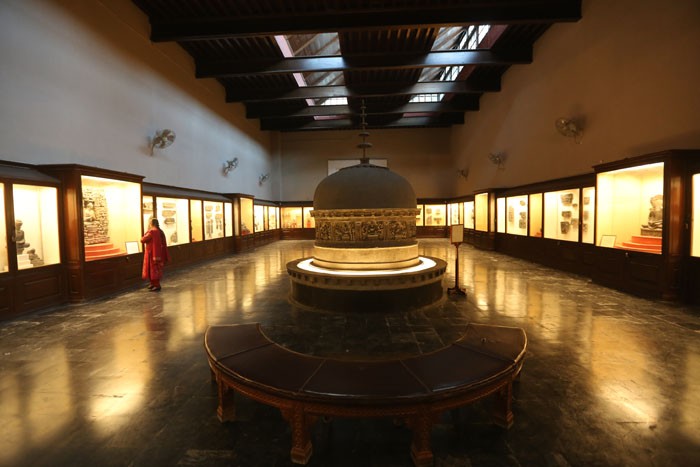

‘Discover the treasures of your past’ is the slogan printed in bold letters on a new sign at the entrance for the Lahore Museum. The sign is part of an announcement for the new, free-of-charge tours being provided by students from the National College of Arts (NCA).
The tours are the result of work done by Maliha Noorani, Assistant professor in the Academic Department at NCA who came back to Lahore after studying abroad to conduct research for her PhD dissertation. Having become used to the experience of studying art overseas, where learning often happens in conjunction with museums, and where museums are able to provide maps, brochures, and even cellphone audio tours free of cost, she decided to create a programme that would help students learn while at the same time improve their experience of the museum.
"The idea was to teach in the gallery, where students can learn so much more," she says.
She decided to recruit students from her course on Weaving narratives survey of South Asian visual and material culture at NCA, and train them to provide guided tours for the general public. The training regime consisted of five weeks of workshops, from about 2.00-4.00pm, on school days. Of approximately 20 students, who started the process, 10 completed it and are now giving the tours on a volunteer basis.
The idea seems to be working.
"When you’re looking at pictures in the classroom, the slide passes by and you sort of forget about it. But when you see the object right in front of you, it’s a completely different," says Hasnain Amin, one of the students now conducting tours.
It also seems to be working in other ways -- it’s helping people open up, for instance. When I went on one of the tours, I noticed three students that were conducting the tour the day walked up to a man looking at some objects in the Hindu, Buddhist, and Jain Gallery with his wife and daughter. They volunteered to explain the significance of exhibits they were looking at, and told them the tour was completely free of cost. The man’s immediate reaction was to say "No. Thanks". But when they repeated there was no charge and they were just trying to help, he reluctantly agreed.
The students started talking about a Hindu relief in the gallery. As I listened to them talk about various Hindu gods, their histories, their attributes, I could not help but wonder what the response of the man and his family would be to learning about the story of a Hindu idol. And I was surprised. He seemed moved, and said, "We are all one. Religions have been created by people. In the end, we are all human beings".
The short one to two minute explanation stimulated him and inspired him to speak. This man had no special interest in history, art or religion; he had been walking past the museum with his family, and had entered only to satisfy the pleadings of his daughter. Indeed, like many of the visitors who enter the museum every day, he was not literate. But the museum provided him with a safe, neutral space in which to learn, think, and express himself.
"This is a very special place," Noorani says, adding, "It’s up to us to try to make good use of it."
Nobel-prize winning English author Rudyard Kipling refers to the LahoreMuseum as the ‘Wonder House’ in his 1901 novel ‘Kim’, referencing the Urdu name for the place, Ajaib Ghar. The story of the eponymous main character begins when he meets his book-long companion while playing on top of the famous cannon that still stands outside the museum building on The Mall. This brings together two people who seem to be entirely disparate: a young British boy, who has grown up entirely on the streets of Lahore, and a Buddhist abbot, who has spent his life in the monasteries of Tibet. Wonderfully, they are able to come together in the course of the story, on the basis of their common humanity.
Perhaps, it is possible that this process can happen not just in fiction, but in reality as well. If the arts can help us understand each other better, then they are no longer a luxury: they might just be vital to our national interest. If that is the case, it is our responsibility to engage and encourage them. Because discovering the treasures of our past might just help us discover ourselves better.
The NCA-sponsored tours are from 2:30 to 3:30pm every day except Friday and Sunday.